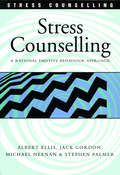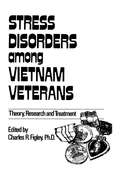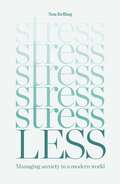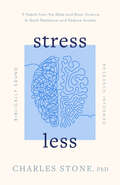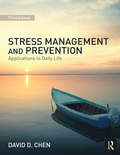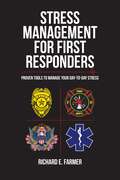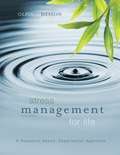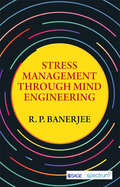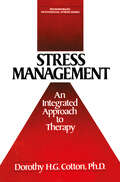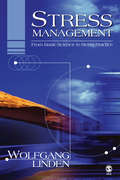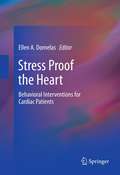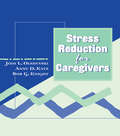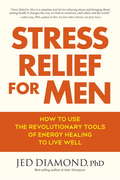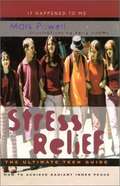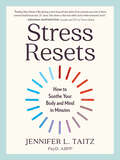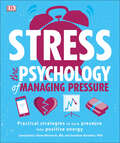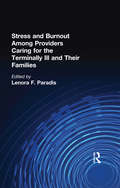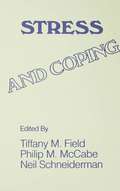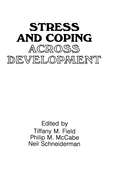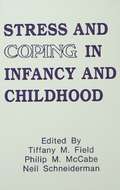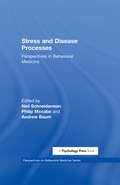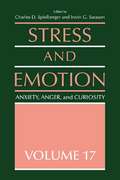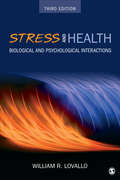- Table View
- List View
Stress Counselling: A Rational Emotive Behaviour Approach (Stress Counselling #11)
by Albert Ellis Michael Neenan Stephen Palmer Jack Gordon`The text is clear and easy to follow with vivid sessional excerpts that illustrate the theoretical dialogue′ - International Review of Psychiatry `The publication proves to contain much instructive and practice-oriented material′ - Nursing Standard Stress Counselling is a comprehensive study of the theory and practice of the Rational Emotive Behaviour approach applied to stress counselling and psychotherapy. Albert Ellis pioneered Rational Emotive Behaviour Therapy (REBT), which has since been adopted internationally. This approach enables the clients to embark on a course of effective counselling which has a clear beginning and end. This book discusses techniques and solutions to common problems and also provides guidance on conducting group work. Its comprehensive coverage includes additional material on techniques such as skills training, relaxation methods, hypnosis and biofeedback.
Stress Disorders Among Vietnam Veterans: Theory, Research (Psychosocial Stress Series #Vol. 1)
by Charles R. FigleyFirst published in 1978. Routledge is an imprint of Taylor & Francis, an informa company.
Stress Less
by Noa BellingJourney Through the Chakras is a comprehensive guide to the inner workings of the chakra system from an age-old Indian spiritual, metaphysical and tantric perspective. The book dives deep into one of the most ancient structures of the spiritual body. With both anatomical and physiological views, it deconstructs the complexities behind the system, explaining the chakras in a simple fashion that is accessible to anyone. Discover how to work with the chakras in your subtle body and begin your journey towards deeper spiritual healing as you learn: • how to harness universal and human energy • the chakras and their connections to the body • spiritual attributes to each chakra • sacred chakra mantras and meditations • kundalini awakening • aromatherapy and crystals for chakra balancing • mudra and yoga practices for chakra healing and much more
Stress Less: 9 Habits from the Bible and Brain Science to Build Resilience and Reduce Anxiety • Biblically Sound • Research Informed
by Charles StoneWe&’re living in a stressed-out world. According to a poll from the American Psychological Association more than a quarter of U.S. adults say they&’re so stressed they can&’t function. But it&’s not just adults. Teenagers and children are also experiencing the negative effects of stress. Blending brain science, biblical truth, and best practices, Stress Less provides hope and healing. From his PhD research, pastor Charles Stone presents nine actionable insights for those battling stress or who have friends or family with fear and anxiety. Stone writes about biblical characters who successfully and unsuccessfully navigated stress and shares how he&’s responded to the stresses in his life, including a cancer diagnoses, heart issue, pre-diabetes diagnosis, and depression.Stone answers the questions: What is stress?What does stress do to the body and brain?How do we build resistance to stress? He shows how changes in thinking, feeling, sleep, spiritual practices, and relationships can help us thrive through life&’s stresses. Readers learn how gratitude and soaking your soul in Jesus can cultivate a life of greater well-being and joy. While we can&’t eliminate the stressors of life, we can learn to navigate them with courage and grace. This timely resource is a practical guide for anyone who feels the creep of stress, who desires freedom and peace, and who wants to Stress Less.
Stress Management and Prevention: Applications to Daily Life
by David D. ChenGain a critical understanding of the nature of stress from a positive psychology framework that allows you to look beyond a simple pathology of stress-related symptoms. This new edition of Stress Management and Prevention integrates Eastern and Western concepts of stress while emphasizing an experiential approach to learning through the use of exercises, activities, and self-reflection. This student-friendly text contains chapters on conflict resolution, mindfulness meditation, time management, prevention of health risks, and cognitive restructuring. Included throughout are an emphasis on mindfulness and the neuroscience behind it, more theories, and new techniques for stress reduction and time management. An updated companion website includes even more video-based activities so students can see techniques in practice.
Stress Management for First Responders: Proven Tools to Manage Your Day-to-Day Stress
by Richard E. FarmerThis book is about the effects of stress on our nation’s people who are involved in police work, corrections, firefighters and related fire service employees, rescue and ambulance staff, emergency medical personnel including doctors and nurses, and member
Stress Management for Life: A Research-Based Experiential Approach (Third Edition)
by Michael Olpin Margie HessonSTRESS MANAGEMENT FOR LIFE: A RESEARCH-BASED EXPERIENTIAL APPROACH, THIRD EDITION emphasizes experiential learning and clearly explains the "how to" of stress management and prevention. Michael Olpin and Margie Hesson offer students more than just a book about stress; they offer students a life-changing experience. This text empowers students to experience personal wellness by understanding and managing stress. The authors encourage students to personalize the information in the text through practical applications and a "tool-box" of stress-reducing resources, including the stress relief audio files and student activities, both found on the CourseMate Website. Well-researched, this text gives stress-related topics a real-life context and helps motivate students to manage stress in a way that accommodates their lifestyle, values and goals.
Stress Management through Mind Engineering
by R. P. BanerjeeExperiencing stress in our everyday life is only human. Be it altercations with peers, upcoming deadlines or unnerving life events which can’t be controlled. There’s good stress that motivates us, and there’s stress that’s unhealthy; it controls our thoughts and feelings, leading to insomnia, heart diseases and even mental health issues. So how do we stop sweating over small things and start living blissfully? Through mind engineering, we can! Stress Management through Mind Engineering takes the readers through the process of mind engineering to help them create a stressless mind. A mind that can bear the force of the external environment by tapping the power within. Read this book to not only win over stress but also eliminate the risk of burnouts, understand the cause of high stress, reflect on one’s actions and behaviour and ultimately live a happier, healthier life.
Stress Management: An Integrated Approach to Therapy (Brunner/mazel Psychosocial Stress Ser.)
by Dorothy H.G. CottonA guide for clinicians from all disciplines to help conceptualize and control stress in clients in a clinical setting. Presents a definition of stress that is operational in a therapeutic context, and suggests ways of translating this understanding into effective counseling.
Stress Management: From Basic Science to Better Practice
by Wolfgang LindenStress Management: From Basic Science to Better Practice examines documented pathways between stress and health and develops the scientific foundations for sound interventions. The book begins with a broad review of the term 'stress' and its importance for health. The text then provides a critical examination of the elements of the stress process, extracts supporting research for a rationale of stress management and describes various stress management techniques and their effectiveness.
Stress Proof the Heart: Behavioral Interventions for Cardiac Patients
by Ellen A. DornelasCardiovascular disease is a leading cause of death throughout the world. Chronic negative emotions such as depression and anxiety place cardiac patients at greater risk for death and recurrence of cardiovascular disease. In 2008 the editor published a book related to this topic, titled Psychotherapy with Cardiac Patients: Behavioral Cardiology in Practice (American Psychological Association). Aside from that book, there are very few resources specifically written for clinicians who treat psychologically distressed cardiac patients. Unlike other medical specialty areas such as oncology, the field of cardiology has been slow to integrate behavioral treatments into the delivery of service. Perhaps because the field has been largely defined and dominated by researchers, mental health clinicians are only starting to recognize behavioral cardiology as a viable arena in which to practice. There is a large void in the practitioner literature on behavioral cardiology. In a review of Psychotherapy with Cardiac Patients, Paul Efthim, Ph.D. wrote, "Her new book goes well beyond previous works by giving specific and detailed guidance about how to tailor psychological interventions with this variegated population." He added, "It would benefit from even more details about treatment approaches." This proposed volume goes beyond the editor's previous volume by providing in-depth descriptions of behavioral treatments for distressed cardiac patients written by eminent leaders in behavioral cardiology. This book describes a wide range of behavioral treatments for the common psychologically based problems encountered by clinicians who treat cardiac patients. The book is organized as follows: Part I focuses on the most psychologically challenging and common presentations of cardiac diagnosis; coronary artery disease, arrhythmia, and heart failure. This section also includes a chapter on heart transplantation, which is a treatment, not a diagnosis, but a treatment that incurs profound psychological impact for the individual. In Part II, behavioral interventions for the general cardiac population are described. Mainstream therapies such as stress management, cognitive-behavioral therapy, and medical family therapy are described, along with approaches that have less empirical support but considerable practical significance such as personality-guided therapy and interventions aimed at altering type D personality traits. The literature in behavioral cardiology has a rich history of investigating maladaptive personality traits and thus it is important to include behavioral approaches that target personality in this volume. Part III focuses on common behavioral problems encountered by clinicians who work with this patient population. Most patients who seek psychological help do so because they perceive themselves to be stressed due to their job or overextended in all areas of their life. Other people with heart disease present with sleep problems and/or an inability to motivate themselves to exercise or quit smoking. There are many practical behavioral approaches that can be helpful for patients with these difficulties and these are detailed in this section of the book. The conclusion of the book focuses on how to integrate the behavioral treatments described in the preceding chapters into a comprehensive treatment model.
Stress Reduction for Caregivers
by Jody Olshevski Anne KatzFirst published in 1999. Routledge is an imprint of Taylor & Francis, an informa company.
Stress Relief for Men
by Jed DiamondDepression, fatigue, chronic pain, sexual dysfunction, anger, and irritability: these are just some of the toxic effects of stress. Stress Relief for Men introduces energy healing techniques based on ancient wisdom and cutting-edge science that are designed to neutralize stress so that you can regain inner strength and power in your life--without talk therapy or drugs. According to preeminent heart surgeon and author Mehmet Oz, MD, "The next big frontier in medicine is energy medicine." This essential resource provides the most scientifically sound tools from this emerging new field applied to the most pressing problems facing men today. Learn how to: * Eradicate depression, anxiety, anger, and irritability * Improve your love life--including better communication with your partner * Eliminate chronic pain, reduce inflammation, and sleep better * Develop peace of mind, greater well-being, and a passion for lifeThis book teaches you how to apply these proven energy healing "power tools": * Earthing (Grounding)--healing through connection with the Earth's surface energy * Heart Coherence--heart-based breathing and visualization techniques * Attachment Love--activating healthy connection in relationships * Emotional Freedom Techniques (EFT/Tapping)--described as an emotional version of acupunctureThe ultimate goal of these practices is health, vitality, and empowerment--so that you can successfully navigate relationships, skillfully face life's challenges, and enjoy your life!
Stress Relief: The Ultimate Teen Guide
by Kelly Adams Mark PowellInsightful and informative, Stress Relief examines the causes of stress most likely to affect teens.
Stress Resets: How to Soothe Your Body and Mind in Minutes
by Jennifer L. TaitzA clinical psychologist gives us 75 quick, scientifically proven techniques and exercises to manage stress and build resilience. Here&’s a promise that could not be more timely or needed: You can dial down your stress in just a few minutes, with no ponderous meditations, medications, or martinis required. Written by Dr. Jennifer L. Taitz, a clinical psychologist who specializes in teaching mindfulness-based behavioral skills to manage intense emotions and situations, Stress Resets provides 75 scientifically proven ways to improve how you respond to stress, both in the moment and the long run. There are accessible yet powerful exercises like dipping your face in ice water to quiet your body and mind; adopting a half smile to change your mood from the outside in; singing your irrational negative thoughts to reduce their believability; building a hope kit so you can remind yourself of what&’s possible in tough moments; and making a pie chart of your life to gain perspective. By incorporating these into your days, you can stop the cycle of obsessing, panicking, and avoiding and instead effectively approach what matters to you most. You&’ll also find stress buffers designed to build your resilience so you can navigate whatever comes your way. Through personal anecdotes, expert interviews, cutting-edge studies, and practical tips, you&’ll learn how to manage your emotions instead of the other way around. Stress Resets will not only change how you view your stress but also give you the hope and confidence you need to reset and ultimately change how you feel.
Stress The Psychology of Managing Pressure
by DKCovering sources of stress in every area of life: work, exams, relationships, social pressure, money, and more, this practical guide combines infographics and self-analysis questionnaires to make information easy to access and apply.This dynamic infographic program, founded on cutting-edge psychological research, enables you to deconstruct and deal with stress head-on. Stress: The Psychology of Managing Pressure helps you identify external and internal sources of stress in your life and reframe unhelpful patterns of thought into powerful psychological solutions that you can apply every day. Underpinned by psychological theory, with relevant findings from psychologists, doctors, and teachers, this book will help you smash the shadow of stress in any area of your life and emerge happier, healthier, and more productive.
Stress Without Distress
by Hans SelyeSTRESS IS NOT SOMETHING TO BE AVOIDED The only way to avoid stress would be to do nothing at all. Virtually all human activity involves stress--from a game of backgammon to a passionate embrace. But this can be defined as the stress of pleasure, challenge, fulfillment. What we all want is the right kind of stress for the right length of time--at a level that is best for us. Excessive or unvaried stress, particularly frustration, becomes distress. And this, in turn, can lead to ulcers, hypertension, and mental or physical breakdown. In this marvelously wise and helpful book, Dr. Hans Selye, the world's leading authority on stress, gives us his prescription for minimizing the psychic insults to the nervous system, mobilizing stress for creative and idealistic purposes, and enjoying a full life in harmony with the laws of Nature.
Stress and Burnout Among Providers Caring for the Terminally Ill and Their Families
by Lenora F ParadisWritten primarily by individuals with hands-on hospice experience, this crucial volume identifies sources of stress among hospice workers and provides workers and managers with strategies to cope with those stressors. It is an enlightening examination of diverse theoretical perspectives and a much needed investigation on stress and burnout for hospice providers and caregivers. Readers will find concrete suggestions for the alleviation of stress and burnout in their work with the terminally ill, as well as theoretical and research discussions. The authors explore a wide range of subjects and problems faced by nurses, physicians, social workers, caregivers, hospice directors, and volunteers. They also discuss the many factors in hospice care that may foster unfavorable stress reactions and eventual burnout among hospice professionals. Current literature on job stress and burnout among those who care for the terminally ill is examined and a model of stress and burnout specific to hospice caregivers is presented. The authoritative chapters also identify theories of stress and burnout and the distinction between the two. Anyone who deals with chronic and terminal illness should read Stress and Burnout Among Providers Caring for the Terminally Ill and Their Families. Hospice caregivers and volunteers, social works, clergy, and health care professionals who work with cancer, renal dialysis, and heart and stroke patients will appreciate the attention given to a subject that has received little study.
Stress and Coping (Stress and Coping Series)
by Tiffany M. Field, Philip M. McCabe and Neil SchneidermanPublished in 1985, Stress and Coping is a valuable contribution to the field of Psychology PP
Stress and Coping Across Development (Stress and Coping Series)
by Neil Schneiderman Tiffany M. Field Philip M. McCabeThis is the second volume based on the annual University of Miami Symposia on Stress and Coping. The present volume is focused on some representative stresses and coping mechanisms that occur during different stages of development including infancy, childhood, and adulthood. Accordingly, the volume is divided into three sections for those three stages.
Stress and Coping in Infancy and Childhood (Stress and Coping Series)
by Neil Schneiderman Tiffany M. Field Philip M. McCabeThe fourth volume based on the annual University of Miami symposia on stress and coping, this new addition to the series is the first to focus on developmental and clinical stressors during infancy and childhood. While developmental stressors such as early separation and stranger anxiety, novelty stress, and fear-evoked personal distress, arise during normal development, clinical stressors result from certain conditions that are relatively common in infancy and early childhood such as premature birth and respiratory disease. Various therapies are discussed -- for example, relaxation and massage -- that can alleviate the stress associated with psychiatric conditions in childhood and adolescence, including depression and adjustment disorder. The result is an integration of diverse research and theory on the psychophysiological, developmental, and psychosocial aspects of stress and coping in animals and humans by some of the leading researchers in the field.
Stress and Disease Processes: Perspectives in Behavioral Medicine (Perspectives on Behavioral Medicine Series)
by Andrew Baum Neil Schneiderman Philip McCabeThis volume presents chapters by leading figures researching the various pathways by which stress may interfere with health maintenance and contribute to disease etiology and progression. Their work focuses on direct effects of stress on the immune and endocrine systems, on behavioral factors in diseases such as cancer and diabetes, and with the general role of stress in illness processes.
Stress and Emotion: Anxiety, Anger and Curiosity, Volume 17 (Stress and Emotion Series)
by Irwin G. Sarason Charles D. SpielbergerThe 17th volume of this prestigious and long-standing Series on Stress and Emotion focuses on recent advances in research by internationally renowned contributors from over a dozen countries. Individual chapters explore the impact of anxiety and stress on emotions in the workplace, school settings, and interpersonal relationships. The original research and practical implications presented in this volume are of interest to all social, behavioral, and medical scientists concerned with stress and anxiety-related issues. The chapters in Part One of this volume examine efforts to assess and manage the effects of stress and anxiety in one's personal life, that result from medical illness, morality issues and athletic competition, along with coping mechanisms across culture and gender. Part Two considers the experience, expression, and control of anger in a variety of cultural, educational and family contexts. The chapters in the final section explore cross-cultural effects of occupational stress and its impact on particular jobs. The contributions to this volume further our understanding of how stress factors, anxious feelings, and emotional responses to both can impact and influence our lives.
Stress and Health: Biological and Psychological Interactions (Behavioral Medicine And Health Psychology Ser.)
by William R. LovalloStress and Health: Biological and Psychological Interactions is a brief and accessible examination of psychological stress and its psychophysiological relationships with cognition, emotions, brain functions, and the peripheral mechanisms by which the body is regulated. Updated throughout, the Third Edition covers two new and significant areas of emerging research: how our early life experiences alter key stress responsive systems at the level of gene expression; and what large, normal, and small stress responses may mean for our overall health and well-being.
Stress and Health: Biological and Psychological Interactions (Behavioral Medicine And Health Psychology Ser.)
by William R. LovalloStress and Health: Biological and Psychological Interactions is a brief and accessible examination of psychological stress and its psychophysiological relationships with cognition, emotions, brain functions, and the peripheral mechanisms by which the body is regulated. Updated throughout, the Third Edition covers two new and significant areas of emerging research: how our early life experiences alter key stress responsive systems at the level of gene expression; and what large, normal, and small stress responses may mean for our overall health and well-being.
